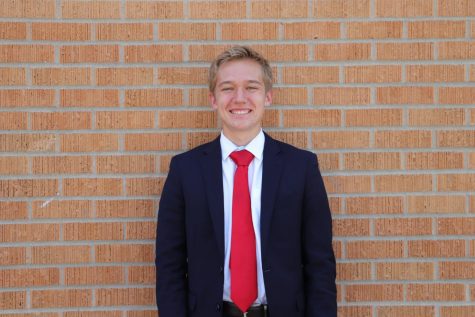The Brownback era: A mixed legacy in education
The Kansas capitol dome on February 26, 2012.
March 31, 2018
Governor Sam Brownback is gone. On January 31 at 3:00 pm, the Governor resigned to become the Trump administration’s ambassador-at-large for international religious freedom. He was replaced by Lt. Governor Jeff Colyer, who is now the 47th Governor of Kansas. Whether you love Brownback or hate him, Kansas saw substantial changes the past seven years under his tenure. From the economy to healthcare, the Brownback administration cemented a lasting legacy.
However, one aspect of Brownback’s legacy that has had an especially large impact at Lawrence High is in education. Changes in statewide education during the past eight years have been a mixed bag.
Changes started on May 22, 2012, when the governor signed a tax bill that would slash income tax revenue by $3.7 billion over five years. The deficit created by the tax cuts led to cuts in many public services, including K-12 education.
“Our district has had to deal with multiple rounds of budget cuts from 2008-2010, then with a period of flat/fixed funding under the ‘block grant’ funding statute,” USD 497 school board president Shannon Kimball said. “When factoring in increased enrollment and inflation over the years, we are operating with fewer dollars per student than at any time since the early 1990s.”
Less funding has put school districts in a bind. During the past few years, USD 497 has had to let go of staff members, many of them certified teachers. The effects of this can be seen in increasing class sizes.
“I know in the English department over the past six years, we’ve lost 1.5 positions, essentially that’s nine sections of classes that we used to able to have that we don’t have anymore, and so that’s about 180 seats that we’ve had to redistribute amongst the classes that we still have,” debate coach Jeff Plinsky said. “That’s why your class sizes are bigger, and that’s probably the largest impact.”
Another aspect of Gov. Brownback’s legacy in education concerns his administration’s relationship with teachers’ unions. Plinsky is the vice president of the Lawrence Education Association (LEA), which represents teachers at the local level.
“We negotiate the teacher’s contracts, we work to make sure that that contract language is enforced,” Plinsky said. “When there are disagreements on the contract language we work to try to come to a mutually agreeable solution to determine what that language means and how things should best be carried out.”
In 2014, the legislature passed a school finance bill that also repealed due process for teachers, and the bill was signed into law by Brownback a few weeks later. Before the repeal, teachers with three or more years under their belt had the right to a hearing before they could be fired or have their contract suspended.
“If a school district wanted to fire a teacher, they didn’t have to tell the teacher why and the teacher couldn’t appeal that decision to anybody,” Plinksy said. “School districts had the power to just fire anyone willy nilly.”
On the positive side of things, the Brownback era has seen changes in the field of career and technical education. On July 1, 2012, with the blessing of Brownback, Senate Bill 155 was passed in the legislature. This bill provided tuition reimbursement for high school students taking college-level technical courses and incentivized students to take these classes by offering certificates valued by employers.
“It’s a pretty good deal,” drafting, engineering and architecture teacher Charlie Lauts said. “You take all of these classes at Lawrence High where you don’t have to pay tuition and then by the time you get out of high school you’re almost halfway done with the degree.”
Many actions early in Brownback’s term are being reversed as well. Last October, the state Supreme Court ruled that current funding for education was inadequate according to Article 6 of the Kansas Constitution. The legislature is set to respond on April 30.
“We have given very minimal salary increases to staff,” Kimball said. “This year we were able to give an increase of about 6 percent on average due to an increase in funding over the previous year’s funding.”
In addition, the House voted to restore due process rights for teachers on March 9 in a 73-48 vote. The bill now awaits consideration in the Senate.
“Many school districts are realizing that having due process in place actually protects them from some legal liabilities, wrongful termination and so forth,” Plinsky said. “These rights are not only good for teachers, but they are also good for the district.”
While some things have been changing for the better as of late, there is still lots of work to be done, even in something as simple as making teachers and staff feel appreciated.
“Anti-public education rhetoric has been worse, and has done a great deal to negatively impact teacher and staff morale,” Kimball said. “As a board member, I feel like it is a constant battle to make our staff feel supported and appreciated for the great work they do with students, especially when legislators speak in such negative terms about public education.”















